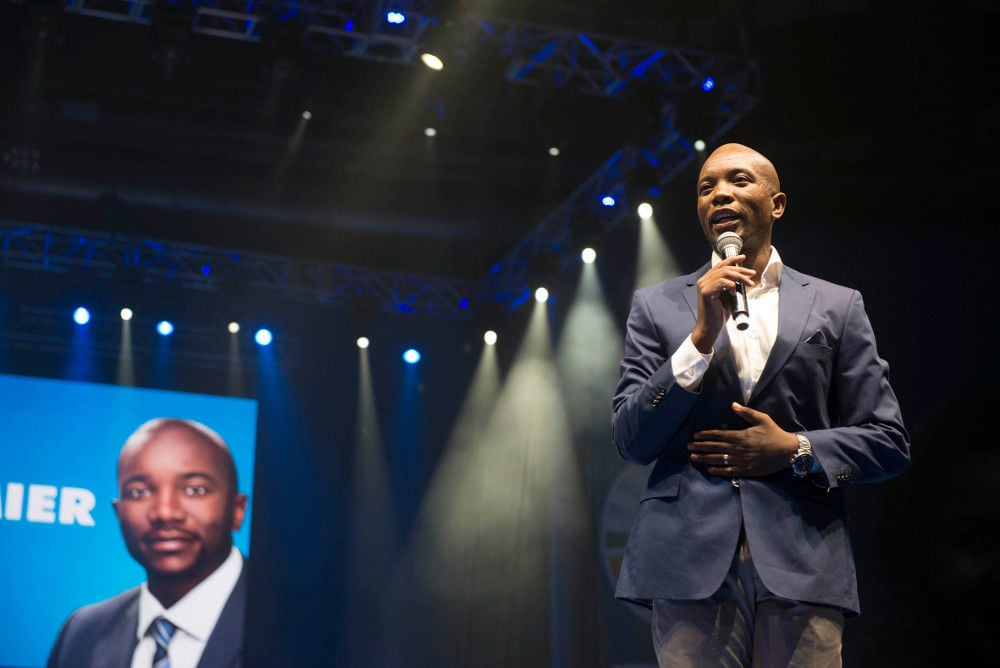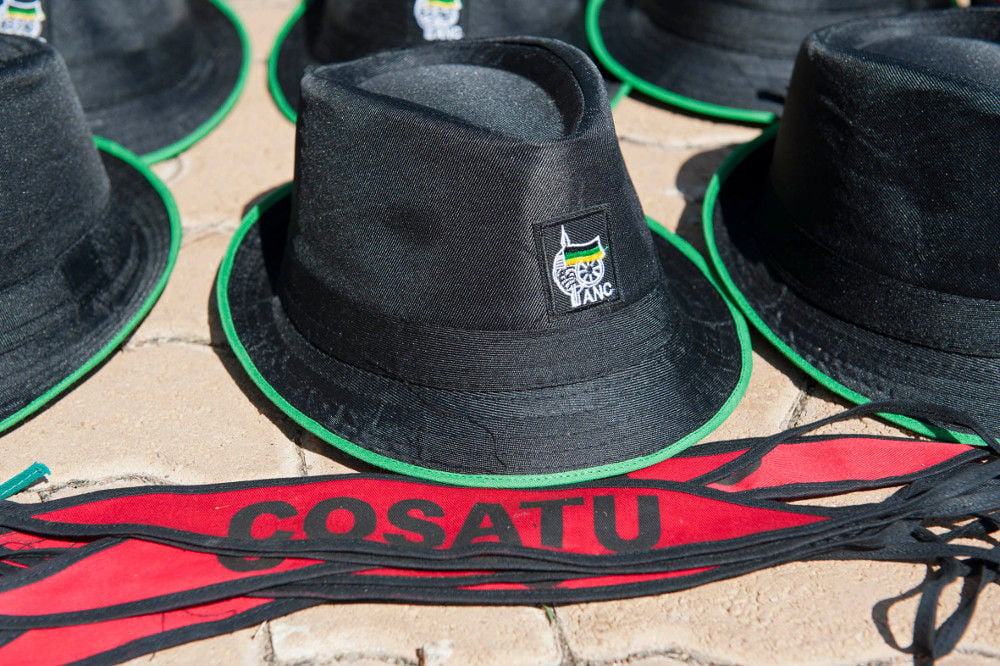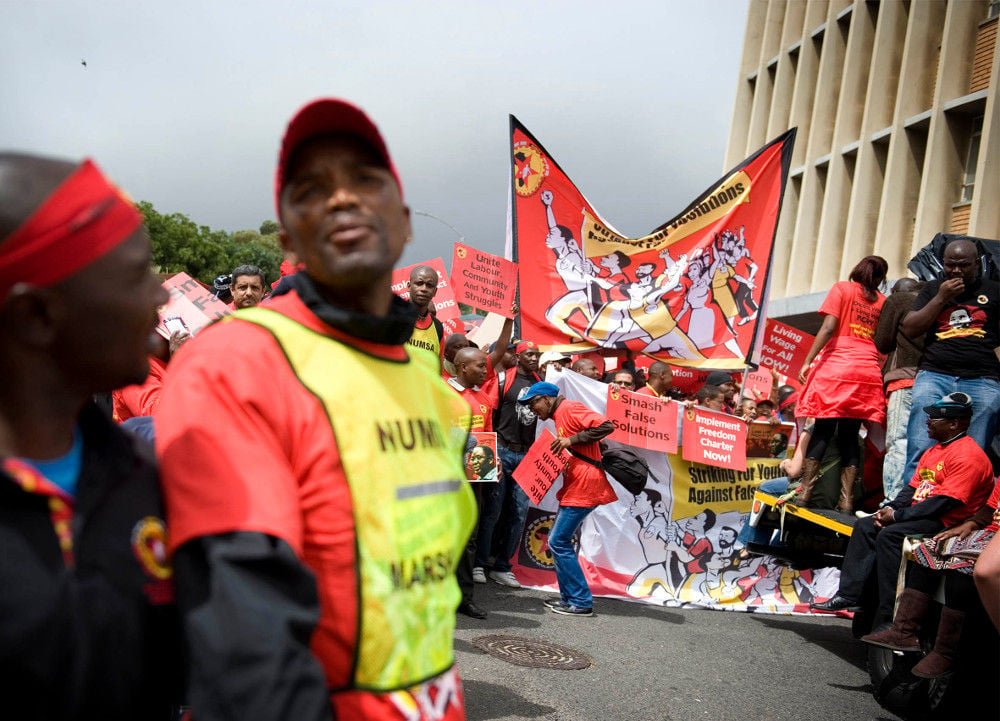Should the ANC fail to reform and rein in corruption
This much is certain: the next five years will be quite good, quite bad, or quite the same. There is also the chance – quite a good chance, actually – that the next five years will be some combination of all three or, much less likely, none of the above.
Such is the nature of scenario sketching, the slightly more reputable cousin of fortune-telling. The conclusion of the 2014 elections removed one major caveat for those who try to speculate intelligently about what the immediate future will look like. But in an arena where practitioners are famous for having three metaphorical hands (in order to be able to point to high-road, low-road and middle-road scenarios at the same time) there are always more roadblocks.
But at least those who deal in scenarios come up with good names.
In 1997 Cosatu’s September commission on the future of the unions postulated three possible futures: “The Desert”, from which there is no way to reach the promised land, “Skorokoro”, a zigzag from problem to problem in a country that is functional but not great, and “Pap ‘n Vleis and Gravy”, where jobs and their fruits are plentiful.
In 2008 the presidency under Thabo Mbeki put forward three scenarios that could play out before 2025: “Not yet Uhuru”, characterised by anger at inequality and infantile politics, “Nkalakatha”, where a nation pulls together to achieve development, and “Muvhango”, where the ANC nearly tears itself apart and everyone suffers the consequences.
Likely scenarios
In February 2014 the Institute for Security Studies (ISS) plotted three scenarios up to 2030: “Bafana Bafana”, where there is much dribbling but little scoring, “Mandela Magic”, where there is vision but there are still challenges, and “A Nation Divided”, where factional politics begets violence and suffering.
In 2013 the South African Institute for Race Relations (SAIRR) broke the triple trend with just two scenarios, with unimaginative designators: “Long Dark Night”, where an interventionist government forcefully tries to reform obstinate private capital, and “New Dawn”, in which the ANC makes initially unpopular choices for what they see as the greater good.
This year, though, the SAIRR made up for its numerical (if not nominative) shortcomings by publishing a book on the next 10 years in South Africa with four likely scenarios: “Narrow Road”, “Wide Road” “Rocky Road”, and “Toll Road”.
“If South Africa is convinced that reform is important it could become more prosperous and more free, that is the Wide Road,” says author and SAIRR director Frans Cronje. “If the ANC sees the need for reform but is not sure it can convince South Africa and forces it, deregulates the labour markets and hammers the unions, that will make us more prosperous but less free; that is the Narrow Road.
“The Rocky Road is a country less prosperous and an ANC that moves to rule with impunity. In the Toll Road we have a complacent ANC and, as dangerous, a complacent business community, and everyone tries to convince themselves all is well while the trends of protest and radicalism grow.”
Party decisions
Those four scenarios are fairly representative of the work being done elsewhere, the potential problems or promises the country will face in 2019, and also for their heavy focus on the ANC. In the next five years, the consensus is that the ANC will come to decide just what kind of party it is. That will set the tone for 2019, which in turn will set the trend for the 2024 elections, which is when a fall from power for the ANC becomes possible.
Along the way, some counterhistorical things may happen.
“There is certainly a probability [that in 2019] there will be a more left-wing party, whether it comes from Numsa [the currently Cosatu-affiliated National Union of Metalworkers of South Africa] or elsewhere,” says Peter Attard Montalto, an emerging markets strategist at Japanese financial group Nomura.
“In response, the ANC may move more to the left to regain that electoral ground … But that is the Sandton consensus. There is a higher probability of the rump of the ANC left after a workers’ party emerges moving further to the right, securing capital and ownership in a more traditional free-market sense, liberalising labour laws in recognition that its past job creation efforts were unsuccessful. You could potentially have a more investor-friendly ANC going into 2019.”
 The ANC will face its most serious threat yet should the DA succeed in positioning black leaders such as Mmusi Maimane as legitimate challengers for the national leadership in 2019. (Paul Botes, M&G)
The ANC will face its most serious threat yet should the DA succeed in positioning black leaders such as Mmusi Maimane as legitimate challengers for the national leadership in 2019. (Paul Botes, M&G)
Nomura is not the only institution telling potential foreign investors that a more market-friendly ANC could be in the offing.
“If the Cosatu split continues down the current road and it becomes, to use the language, the ‘labour desk of the ANC’, in one sense you may see a bit more ideological coherence in the ANC,” says the ISS’s Jakkie Cilliers. “You may see the ANC actually implementing the National Development Plan [NDP] and ceasing to be the big tent it is at the moment.”
Approach is key
The NDP and the ANC’s approach to it are key to the next five years, almost all centrist analysts agree. Its recommendations underlie much of the ANC’s manifesto on which it won national re-election. How the party deals with the neoliberal NDP proposals found so unpalatable by unions, from job-performance monitoring for teachers to making firing employees less fraught, will not only have a direct impact on the quality of life of citizens, but will also show where the ANC is heading in the next generation, the analysts say.
And how the ANC intends to approach the NDP, in turn, could be signalled shortly, Cilliers says.
“Look at the makeup of the [second Zuma] Cabinet. Right now it is large and lacks ideological coherence, so we have divergent policies on the economy and in other areas,” says Cilliers. “If we have a focused Cabinet with someone like Cyril Ramaphosa as an executive deputy president, and he is given the authority to essentially run the country, then we are looking at a high-road scenario. If we have a large, ideologically disparate Cabinet with two executive deputy presidents, we are more likely going nowhere or maybe even on the low road.”
Few will venture a straight prediction on whether Cosatu will split before 2019 or after, but the consensus is that, eventually, a workers’ party must emerge. Will it happen before the next elections?
“I think it is 50-50,” says University of the Witwatersrand vice-chancellor and political analyst Adam Habib. “If you force me to make a call, my gut feel is that it will happen by then, and that the possibility is increasing.”
Furious race
Such a split, should it gear up well enough for the next national election, could make for a furious race. Numsa has national reach, access to money, a ready-made campaign machine, a struggle history and, in fact, everything except the proven political will to fight for ballots.
The push against a split from the ANC – which, Habib says, could yet win back the left with deft footwork and quick concessions – is rooted in past examples. “There are players saying: ‘Are you sure you want to be in the cold? Don’t you remember what happened to those who went out into the cold?’ ”
Such a strong push from a serious contender on the left would, regardless of its support in 2019, have a great impact on the next five years: increases in social grants, even stronger protection for workers, maybe even nationalisation of the likes of Sasol. In short, the re-emergence of socialism not just in rhetoric, but also in practice.

Cosatu affiliates breaking away from the alliance could threaten the ANC further. (Madelene Cronjé , M&G)
But that is too near-future, too balanced on a knife edge to call, so scenarios universally include both a 2019 with the ANC as the only (theoretical) worker party, and a half-decade during which the ruling party must either fight for that title or abandon it entirely.
Notwithstanding post-election euphoria born of election-year promises, which will probably see a temporary reduction in protests and the frustration that fuels them, South Africa is in muddle-through territory for the time being.
Jobs top of the list
That makes for a 2019 election in which the central theme is, once again, jobs – only with more urgency. If the country dribbles along, lacks decisive leadership, or otherwise simply carries on as usual, analysts predict growth will remain sluggish, money scarce and services unevenly distributed.
“South Africa probably doesn’t blow up,” says Attard Montalto, summarising the nothing-changes scenario. “It probably doesn’t grow at a rate sufficient to feed its developmental needs, the NDP is still touted but not fully implemented, with contestation around policy, and foreign investment is there but not enough to boost the economy and create jobs.”
That comes with a host of potential problems, different analysts believe. Economic pressure could see greater levels of xenophobia, a turn to conservative values, a slide towards totalitarianism, and worse levels of crime and corruption.
Things could be worse; given decisive action, everyone from bankers to academics believe, those problems could all be avoided or mitigated – but decisive action in the wrong direction could make for fire and brimstone. A radical land reform programme without the resources to settle the recipients of restituted land properly could both destroy local and foreign capital investment and leave ordinary South Africans angry. Completely liberalising the electricity sector but inadequately regulating it could see both punishing electricity prices and widespread blackouts.
The opposite possibility, the future in which 2019 is a time of hope and optimism and 2024 features voters for whom poverty is history, analysts believe, relies on one of two things: an ANC that reforms itself, cracks down on corruption and makes initially unpopular choices and resists the urge to blink; or an ANC that tears itself apart to such an extent that true multiparty democracy forces coalition governments in the majority of provinces, if not nationally.
Opposition parties
Either way there are few who do not anticipate a 2019 election again framed in relation to the ANC, where opposition parties universally define themselves in how they differ from the ANC, how they could do a better job than the ANC, and why voters should choose them simply because they are not the ANC.
Meanwhile, those opposition parties could well be turning into the ANC.
“If the ANC does not reform and it suffers an election defeat within the decade to, say, a Democratic Alliance-led coalition, that coalition will beat the ANC because it becomes better at being the ANC than the ANC is,” says Cronje. “The DA could position itself in the slipstream of the disaster that the ANC has become, and as pieces break off the DA could gobble them up.”

Numsa may yet lead a breakaway from Cosatu and the tripartite alliance towards the left of the ANC, something analysts say is almost inevitable. (David Harrison, M&G)
That possibility raises other questions. Can the DA make the transition from Helen Zille as its leader to the different kind of presidential candidate even Zille believes the party needs? Can another party copy the policies of the ANC that the country continues to vote for, capture voter imagination the way the ANC did this year, but avoid the scandals and deficiencies that plague the ruling party?
The answers that 2019 provides could determine who has access to water and sanitation, how many people have jobs, and how well children are educated.
Traditional metrics
To see whether South Africa is going up, down or sideways, there are the traditional metrics: economic growth and unemployment rates, the matric pass rate, the number and violence of protests.
But in the next five years analysts will also be watching for the use of racial language in politics, changes in the rate of prosecutions for corruption, the number of black people enrolling in medical aid schemes. In such trends, they believe, the future could be read, or at least the varying probabilities of different futures.
But though scenarios put small decisions into a larger context, and are helpful as a guide, they are also thought exercises rather than truth – and South Africa has a seemingly infinite capacity to surprise.
“Who would have thought in 1985 it was likely the ANC would, within a decade, halve the interest rate put in place by the Nats?” quips Cronje on the fundamental nature of all scenarios. “Small changes in the present lead to huge shifts in the future.”
Major upsets are possible
Casting scenarios is a useful tool in debates or policy formulation, but it does not amount to actual prediction. If any element of a scenario comes true, it is more an illustration of random chance than any indication of how solid the scenario was.
Besides that, there are basic assumptions underlying all scenarios about the external environment, mostly that it will remain stable and predictable. If any of these factors change, the scenarios fall apart entirely.
Some of these possible surprises include:
- Acute instability in any neighbouring country or major trading partner;
- A global financial crisis (or, less likely, a boom);
- A fast-changing climate that alters rainfall patterns or the distribution of diseases, such as malaria;
- An environmental crisis, such as unrestrained acid mine drainage into waterways;
- A practical breakthrough in technology in a field such as energy generation; and
- A significant shift towards populism, conservatism or politically applied religion in South Africa.
Five years and into the future
In the next five years the following specific sets of decisions may play outsized roles in what 2019 will look like – for better or for worse.
ANC internal democracy
Small changes in how the ruling party (which will most likely still be ruling after 2019) chooses its leaders and deploys them to government can change everything from fiscal policy to labour regulations. If the party prohibits slate voting, ignores factional loyalty in appointments and allows internal campaigning, the effects on the mix of leaders could be dramatic.
Restructuring Parliament
The 2002 Van Zyl Slabbert commission on electoral reform recommended a shift to a constituency-based Parliament. That, the commission said – and many still believe – would make for a more accountable and responsive legislature. If it did happen it would transform the institution.
Fracking in the Karoo
There may be significant deposits of natural gas under the Karoo, and they may be economical to extract. The extent to which hydraulic fracturing (or fracking) is allowed, regulated, taxed and protested against will likely have significant consequences for employment, energy availability and economic growth, most notably in the decade after 2019.
Projecting power north
Large South African companies show little hesitation in heading north of the Limpopo and south of the Sahara, but South Africa’s policy, and perhaps even ideology, is not settled when it comes to involvement elsewhere on the continent. How much attention, money and perhaps blood is put into peacekeeping and infrastructure development could define South Africa’s role on the continent and future gains – or simply distract from pressing problems at home.